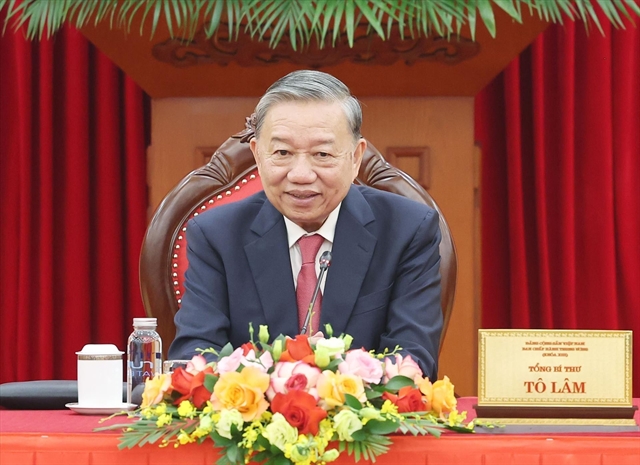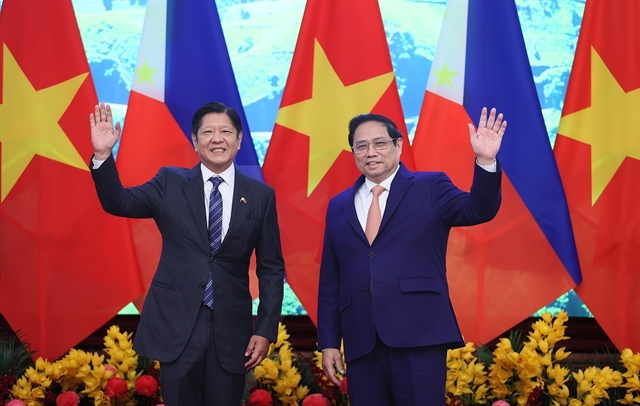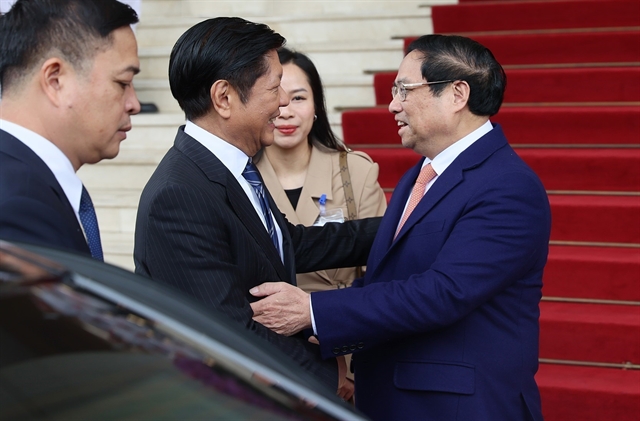 Politics & Law
Politics & Law

 |
| Prime Minister Phạm Minh Chính met Philippine President Ferdinand Romualdez Marcos Jr., who is on a state visit to Việt Nam. — VNA/VNS Photo |
HÀ NỘI — Prime Minister Phạm Minh Chính met Philippine President Ferdinand Romualdez Marcos Jr., who is on a state visit to Việt Nam, in Hà Nội on Tuesday.
Welcoming the President’s first state visit, on the threshold of Việt Nam’s traditional Tết (Lunar New Year), PM Chính said that the visit will contribute to promoting the two countries’ friendship and multi-faceted cooperation.
President Marcos Jr. affirmed that the Philippines always attaches importance to and wants to lift the Philippines-Việt Nam strategic partnership to a new height.
The two sides agreed to increase the exchange of delegations at all levels, affirming that regular meetings between leaders of the two countries contribute to consolidating and strengthening political trust and comprehensively promoting bilateral collaboration.
They also agreed to soon fully carry out bilateral cooperation mechanisms; and comprehensively review the action programme to implement the strategic partnership for the 2019-2024 period, and develop another for the new period, with priority given to new and potential fields such as digital transformation, green economy, circular economy, climate change response and energy transition.
The leaders discussed measures to strengthen economic, trade and investment cooperation with a goal of bringing two-way trade to US$10 billion by 2025; and to create a favourable business and investment environment, especially in areas where both sides have needs and strengths such as processing technology, infrastructure, automobile supporting industries, renewable energy and hi-tech agriculture.
Regarding rice trade, PM Chính affirmed that this is one of the important areas of cooperation, not only for economic benefit but also for ensuring food security. He proposed the two sides effectively implement the memorandum of understanding on rice trade cooperation signed on this occasion.
As for defence and security cooperation, the two leaders affirmed that they will continue to promote the role of the defence, security and maritime cooperation mechanisms; soon resume the joint committee on sea and ocean cooperation at the deputy foreign ministerial level; improve the effectiveness of joint patrols, and search and rescue at sea; and strengthen cooperation in the fight against drug crime, cybercrime, high-tech crime and economic crime.
President Marcos Jr. agreed with PM Chính's proposal to promote cooperation in potential fields such as education and training, science and technology, tourism, culture, people-to-people exchange, and collaboration between localities; and encouraged the opening of more direct flights connecting famous destinations of the two countries.
 |
| The two leaders agreed to continue close coordination with each other and with ASEAN countries and partners to maintain and implement ASEAN's common viewpoint on the East Sea. — VNA/VNS Photo |
Discussing international and regional issues, the two leaders appreciated the close coordination at regional and international forums such as the Association of Southeast Asian Nations (ASEAN), the United Nations, the Asia-Pacific Economic Cooperation (APEC), and the Asia-Europe Meeting (ASEM); and emphasised the maintenance of solidarity and the central role of ASEAN, as well as the consensus on building a strong, united and resilient ASEAN Community.
Regarding the East Sea (known internationally as the South China Sea) issue, the two sides agreed to continue to coordinate closely with each other and with ASEAN countries and partners to maintain and implement ASEAN's common viewpoint on the East Sea; ensure the full and serious implementation of the Declaration on the Conduct of Parties in the East Sea (DOC); speed up negotiations on building an effective and efficient Code of Conduct in the East Sea (COC) in accordance with international law, including the 1982 UN Convention on the Law of the Sea (UNCLOS); and build the East Sea into a sea of peace, cooperation and development, thus contributing to the stable, prosperous and sustainable development of the region and the world. — VNS